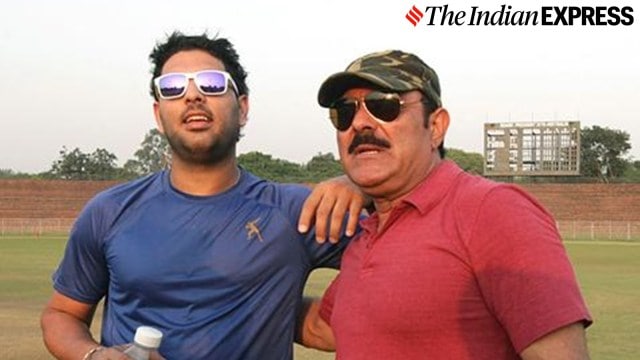📣 For more lifestyle news, click here to join our WhatsApp Channel and also follow us on Instagram
‘I don’t want to be a…’: Yuvraj Singh reflects on his father’s tough love and not using the same parenting approach on his children; expert on avoiding projection
“He was harsh at times, but it was also his dream that I live his dream, which I understood,” Yuvraj Singh shared.
 Former cricketer Yuvraj Singh sharing some lighter moments with his father Yograj Singh off the field at Sector 16 Cricket Stadium in Chandigarh on Thursday, October 11 2012 (Source: Express photo by Jasbir Malhi)
Former cricketer Yuvraj Singh sharing some lighter moments with his father Yograj Singh off the field at Sector 16 Cricket Stadium in Chandigarh on Thursday, October 11 2012 (Source: Express photo by Jasbir Malhi)Former Indian cricketer Yuvraj Singh opened up about fatherhood, his childhood, and how his relationship with his own father, Yograj Singh, shaped the man he is today, in a recent interview. The former cricketer, known for his fearless performances on the field and his resilience off it, has now embraced a more relaxed and family-oriented phase of life. As a father to son Orion and daughter Aura, Yuvraj is clear about what he doesn’t want to carry forward from his own upbringing.
“With my father, it was always about cricket. I don’t want to be a coach to my kids, I want to be a dad,” he stated. Appearing alongside his mother, Shabnam Singh, in an episode of Curly Tales on YouTube, Yuvraj revealed that growing up under the stern guidance of Yograj Singh, a former cricketer himself, was often intense.
“He was harsh at times, but it was also his dream that I live his dream, which I understood,” Yuvraj shared. “There were times when I didn’t like it, but I think sometimes you have to do things which you don’t like to understand what you want to achieve.” And while that pressure may have helped him break into the national team at just 18, Yuvraj says he now wants something very different for his children.
So, how can children raised under extremely goal-oriented parenting styles learn to develop a distinct identity?
Neha Cadabam, senior psychologist and executive director at Cadabams Hospitals, tells indianexpress.com, “Children who grow up in highly goal-driven environments often internalise performance as the primary route to approval and self-worth. This can blur the line between who they are and what they achieve. As adults, developing a distinct identity may involve unlearning these early associations and exploring personal interests outside the realm of achievement.”
View this post on Instagram
Psychologically, she adds that this process is often supported through self-reflection, therapy, or exposure to more diverse definitions of success — ones that include emotional intelligence, relationships, creativity, or community involvement. It’s also helpful when these individuals find safe spaces where vulnerability and curiosity are encouraged, rather than measured outcomes.
What does this shift in Yuvraj’s parenting philosophy signify?
Cadabam notes that this shift represents a meaningful evolution in how parenting is being reimagined by many second-generation parents. “For individuals like Yuvraj Singh, who were raised in high-pressure, performance-oriented homes, the decision to separate coaching from parenting reflects a deeper desire for emotional closeness, unconditional acceptance, and relational presence.”
Psychologically, this signifies healing and conscious parenting, a move away from transactional dynamics (“you perform, I love”) toward connection-driven ones (“I love you, period”). It’s a powerful reminder that nurturing a child’s sense of safety and emotional confidence is just as valuable as preparing them for success.
Healthy ways for parents to support child’s ambitions without projecting unfulfilled dreams onto them
“One healthy way is to stay curious about the child’s emerging interests, even when they diverge from the parent’s own dreams,” highlights Cadabam. This means asking, “What lights you up?” rather than “What will make you successful?” Parents can act as facilitators, not directors, providing tools, exposure, and emotional support while leaving space for the child to choose their own journey.
“Practicing reflective parenting helps too: when a parent feels triggered or overly invested in a child’s outcome, it’s useful to ask, “Is this about them, or about something unresolved in me?” Therapy or parent coaching can provide support in unpacking those patterns,” concludes the expert.
📣 For more lifestyle news, click here to join our WhatsApp Channel and also follow us on Instagram





- 01
- 02
- 03
- 04
- 05






















